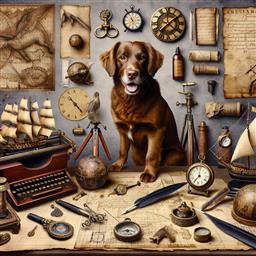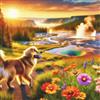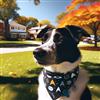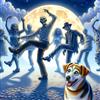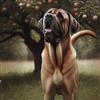1670s Dog Names - Page 4
Updated: July 04, 2024
Welcome to our unique compilation of canine monikers inspired by the historical period of the 1670s. During this era, dog naming traditions were heavily influenced by societal norms, events, and popular culture of the time. It was a period of exploration, science, and the arts, which had a profound impact on the way people named their beloved pets.
This page is dedicated to providing a comprehensive list of dog names that were popular during this time. Whether you're a history enthusiast, a dog lover, or simply looking for a unique name for your new canine companion, we believe you will find these names truly fascinating. These names not only reflect the spirit of the 1670s, but also carry a sense of elegance and sophistication unique to that era.
So, if you are looking for a name that stands out from the common names of today or simply want to pay homage to an era of immense historical significance, this page is for you. Get ready to embark on a journey back in time to the 1670s and explore the world of dog names as they were in this remarkable period in history.
| Name | Reason to Choose |
|---|---|
| Mercy | Virtue names were popular in the 1670s |
| Mill | Named after the common building |
| Milton | Inspired by the famous poet's name |
| Ned | Short, simple names like Ned were common for dogs in the 1670s |
| Nehemiah | Biblical names like Nehemiah were popular among religious dog owners |
| Newton | Inspired by the prominent physicist's name |
| Noble | Inspired by the term for aristocracy |
| Obadiah | Biblical names like Obadiah were common for dogs in the 1670s |
| Parchment | Refers to the material on which many documents were written in the 1670s |
| Parliament | Inspired by the political institution |
| Penny | Named after the common British currency |
| Pewter | Reflects a common material used for making dishes and other household items during the 1670s |
| Phineas | Phineas, a biblical name, was often given to dogs by religious families |
| Pike | Named after the popular fish |
| Pilgrim | Religious movements affected pet names |
| Pippin | Inspired by the popular apple variety |
| Porter | A common job during the 1670s, making it a realistic name for a dog of that period |
| Psalm | Religious songs or poems from the Bible, showing the importance of religion in 1670s society |
| Puritan | Religious movements of the time influenced pet names |
| Quaker | Religious movements influenced pet names |
| Quill | A homage to the primary writing implement in the 1670s |
| Quincy | Quincy, a French name, was popular for dogs owned by French-speaking families |
| Reginald | A classic English name, used for humans and pets |
| Regis | Regis, meaning 'king', was a popular name for dogs with a regal appearance |
| Roderick | Roderick, a strong and powerful name, was popular for male dogs |
| Rufus | Rufus, meaning 'red-haired', was a common name for dogs with reddish fur |
| Rupert | Human names like Rupert were frequently given to dogs during this period |
| Sampson | Sampson, a name of Biblical origin, was often given to strong and powerful dogs |
| Scripture | Demonstrating the religious fervor of the time, this would make a fitting name for a 1670s dog |
| Seamus | Irish names like Seamus were common for dogs in the 1670s |
|
Suggest:
|
Submitted!
|
| 1 2 3 4 5 6 | |
1670s Art-Inspired Dog Names
| Name | Description |
|---|---|
| Bellini | Named after Giovanni Bellini, an influential Italian Renaissance painter |
| Bernini | A tribute to Giovanni Lorenzo Bernini, an Italian sculptor and architect |
| Botticelli | This name pays homage to Sandro Botticelli, an Italian painter of the Early Renaissance |
| Boucher | This name reflects François Boucher, a famous French painter |
| Bruegel | Named after Pieter Bruegel the Elder, the most significant artist of Dutch and Flemish Renaissance painting |
| Canaletto | A Venetian painter known for his landscapes, or "vedute", of the city Venice |
| Caravaggio | Tribute to the Italian painter, Michelangelo Merisi da Caravaggio |
| Donatello | In honor of Donatello, an Italian sculptor of the Renaissance |
| Durer | Inspired by Albrecht Durer, a German painter, printmaker, and theorist of the German Renaissance |
| ElGreco | In commemoration of El Greco, a master of Spanish Renaissance |
| Gainsborough | Inspired by Thomas Gainsborough, a prominent British painter |
| Hals | Frans Hals, a Dutch golden age artist, is the inspiration |
| Holbein | A tribute to Hans Holbein the Younger, a German artist and printmaker |
| Leonardo | A tribute to Leonardo da Vinci, an Italian polymath of the High Renaissance |
| Manet | This is a tribute to Édouard Manet, a pivotal figure in the transition from Realism to Impressionism |
| Michelangelo | Named after Michelangelo di Lodovico Buonarroti Simoni, a famous Italian sculptor, painter, architect and poet of the High Renaissance |
| Poussin | Reflects the influence of Nicolas Poussin, an important French painter of the 17th century |
| Raphael | In honor of Raffaello Sanzio da Urbino, known as Raphael, a master painter and architect of the Italian High Renaissance |
| Rembrandt | Named after Rembrandt Harmenszoon van Rijn, a prominent Dutch artist in the 17th century |
| Renoir | Reflecting the influence of Pierre-Auguste Renoir, a French artist who was a leading painter in the development of the Impressionist style |
| Rubens | This pays homage to Peter Paul Rubens, a significant Flemish Baroque painter |
| Tintoretto | Inspired by the Italian painter, Jacopo Comin, better known as Tintoretto |
| Titian | Named for Titian, a leading artist of the Italian Renaissance |
| Velázquez | After Diego Velázquez, a significant Spanish painter in the 1670s |
| Vermeer | Inspired by Johannes Vermeer, a famous Dutch painter from the 1670s |
|
Suggest:
|
Submitted!
|
1670s Geography-Inspired Dog Names
| Name | Description |
|---|---|
| Amazon | The Amazon rainforest was discovered and explored during this era |
| Andes | Reflecting the exploration of South America during the 17th century |
| Atlas | The Atlas mountains were important in the African geography of the 1670s |
| Boston | The city was very significant in the American Revolution of the 18th century |
| Brussels | It was the capital of the Spanish Netherlands in the 1670s |
| Caledonia | It was a term used by the Romans to describe Scotland during this era |
| Danube | This European river was a significant trade route during the 1670s |
| Delhi | The Mughal Empire, based in Delhi, was at its zenith in the 1670s |
| Euphrates | It was a major trade route during the 1670s |
| Everest | Named after the world's highest mountain, symbolizing the spirit of exploration |
| Ganges | The Ganges River was crucial to the Indian subcontinent during this era |
| Havana | The city was captured by the British in 1762, a significant historical event |
| Hudson | Henry Hudson explored and gave his name to the Hudson River during this period |
| Indus | The Indus Valley civilization was explored in the 1670s |
| Kilimanjaro | Named after the highest mountain in Africa, symbolizing the spirit of exploration |
| Madrid | Spain, with its capital in Madrid, was a major world power in the 1670s |
| Neptune | Named after the Roman god of the sea, reflecting the importance of seafaring in the 1670s |
| Niagara | Niagara Falls was a significant geographical discovery in North America |
| Nile | It was an important part of ancient Egyptian civilization |
| Orient | European powers were expanding their influence in the East, often referred to as the Orient |
| Rome | Rome was a significant city in history and culture during this era |
| Sahara | Named after the largest desert, symbolizing the exploration of new frontiers |
| Seine | Paris, on the banks of the Seine, was a major cultural center in the 1670s |
| Thames | London, located on the River Thames, was a major world city in the 1670s |
| Versailles | The Palace of Versailles was constructed during this era |
|
Suggest:
|
Submitted!
|
1670s Royal Dog Names
| Name | Description |
|---|---|
| Anne | A nod to Anne, Queen of Great Britain, who was born in the 1670s |
| Bourbon | This is the royal house that ruled France in the 1670s |
| Catherine | Named after Catherine of Braganza, queen of King Charles II of England |
| Charles | It's named after King Charles II of England, who reigned during this time |
| Christina | Named after Christina, Queen of Sweden, who abdicated her throne in the 17th century |
| Eleanor | Eleanor of Austria died in the 1670s, making this a fitting tribute |
| Elizabeth | Elizabeth Charlotte, Princess Palatine, was a prominent figure of the time |
| Ferdinand | In honor of Ferdinand III, Holy Roman Emperor, who reigned in the 17th century |
| George | In honor of George I of Great Britain, who was born in the 1670s |
| Hapsburg | Referring to the House of Hapsburg, which had significant influence in Europe during the 1670s |
| Henry | Many kings across Europe were named Henry during the 17th century |
| Isabella | A tribute to many queens named Isabella during the 17th century |
| James | James II of England began his reign towards the end of the 1670s |
| Leopold | A nod to Leopold I, Holy Roman Emperor, a key figure in the 1670s |
| Louis | A nod to Louis XIV of France, also known as the Sun King, who was a significant figure in the 1670s |
| Louise | A nod to Louise de La Vallière, a mistress of Louis XIV |
| Margaret | A tribute to Margaret Hughes, considered the first professional actress of the English stage during the 1670s |
| Maria | Maria Theresa of Spain was a notable figure in the 1670s |
| Matilda | Named after several queens and princesses named Matilda during the 17th century |
| Orleans | This name is drawn from the House of Orléans, a cadet branch of the French royalty |
| Philip | In honor of Philip IV of Spain, whose reign had a significant influence on the 1670s |
| Sophia | Sophia of Hanover was a significant figure and potential heir to the throne during this era |
| Stuart | A reference to the House of Stuart, which held the English throne in this period |
| Versailles | Inspired by the Palace of Versailles, the royal residence of Louis XIV |
| William | The name is inspired by William III of England, who was active during the period |
|
Suggest:
|
Submitted!
|
1670s Historical Figures Dog Names
| Name | Description |
|---|---|
| Behn | Inspired by Aphra Behn, one of the first English women to earn a living by writing |
| Boyle | Named after Robert Boyle, a key figure in chemistry |
| Bunyan | In honor of John Bunyan, author of The Pilgrim's Progress |
| Dryden | Inspired by John Dryden, the first Poet Laureate in England |
| Evelyn | Named for John Evelyn, a diarist and gardener |
| Fenelon | Named after François Fénelon, a French theologian and writer |
| Halley | An homage to Edmond Halley, an English astronomer |
| Hooke | Named for Robert Hooke, a renowned scientist in the 1670s |
| Huygens | A tribute to Christiaan Huygens, a leading scientist |
| Leibniz | Gottfried Leibniz, known for his philosophical and mathematical contributions, inspired this name |
| Locke | A nod to the influential philosopher, John Locke |
| Lully | A nod to Jean-Baptiste Lully, a French composer |
| Maria | Inspired by Maria Sibylla Merian, a notable scientific illustrator |
| Maria | Inspired by Maria Sibylla Merian, a notable scientific illustrator |
| Milton | A nod to the poet, John Milton |
| Moliere | This name honors the French playwright, Moliere |
| Newton | Named after Sir Isaac Newton, a prominent mathematician and physicist of the 1670s |
| Pascal | Named after Blaise Pascal, a French mathematician and philosopher |
| Pepys | An homage to Samuel Pepys, a famous diarist |
| Purcell | Inspired by Henry Purcell, an English composer |
| Racine | This name honors Jean Racine, a leading French dramatist |
| Spinoza | Baruch Spinoza, a significant philosopher of the period, is the inspiration |
| Swift | In honor of Jonathan Swift, author of Gulliver's Travels |
| Vermeer | Inspired by the Dutch painter, Johannes Vermeer |
| Wren | Named in honor of Sir Christopher Wren, a famous architect |
|
Suggest:
|
Submitted!
|
1670s Literature-Inspired Dog Names
| Name | Description |
|---|---|
| Barclay | In reference to Robert Barclay, a Quaker theologian and author |
| Behn | After Aphra Behn, a playwright and novelist in the 1670s |
| Bunyan | Named after John Bunyan, author of 'Pilgrim's Progress' |
| Defoe | After Daniel Defoe, a prominent and prolific author |
| Donne | An homage to the poet John Donne, whose work was still influential in the 1670s |
| Dryden | John Dryden was an influential poet and playwright in the 1670s |
| Evelina | A common name in 1670s literature, suitable for a female dog |
| Hobbes | Inspired by the political philosopher Thomas Hobbes |
| Hooke | In honor of Robert Hooke, a natural philosopher and author |
| Locke | After John Locke, a prominent philosopher in the 1670s |
| Marvell | Inspired by the poet Andrew Marvell, whose works were popular in the 1670s |
| Milton | John Milton's 'Paradise Lost' was a significant work in the 1670s |
| Moliere | Taken from the pen name of Jean-Baptiste Poquelin, a famous French playwright |
| Newton | After Sir Isaac Newton, whose works were influential in the 1670s |
| Pamela | A nod to the unfinished novel 'Pamela', a popular name in 1670s literature |
| Paradise | Inspired by John Milton's 'Paradise Lost', published in 1667 |
| Pascal | In recognition of Blaise Pascal, a French philosopher and writer |
| Pepys | Inspired by Samuel Pepys, a famous diarist in the 1670s |
| Pilgrim | Inspired by John Bunyan's 'Pilgrim's Progress', published in 1678 |
| Rochester | Taken from John Wilmot, 2nd Earl of Rochester, a leading poet in the 1670s |
| Rousseau | After Jean-Jacques Rousseau, a philosopher whose ideas were emerging in the 1670s |
| Spinoza | In honor of Baruch Spinoza, a philosopher whose works were known in the 1670s |
| Swift | A nod to Jonathan Swift, a satirist whose works were popular in the 1670s |
| Voltaire | Inspired by the pen name of François-Marie Arouet, a famous French writer |
| Wren | Named for Christopher Wren, a prolific author and architect in the 1670s |
|
Suggest:
|
Submitted!
|
User Submitted Images
There are currently no user submitted images for this page. This is your opportunity to be the first! Submit your photo below.
User Recommendations
There are currently no name recommendations for this page. This is your opportunity to be the first! Make your recommendation below.
Recently Updated
We would like to take this time to thank all of our visitors that make DogNamed.com the best dog naming resource on the web. Our site would not be where it is today without your suggestions, ratings, and photo submissions. So pat yourselves on the back for a job well done and keep up the good work! If you have any comments, suggestions, or ideas for the this page or any part of our site, don't hesitate to drop us a line on our Contact Page. Thank you! -The DogNamed Team





